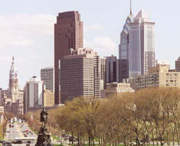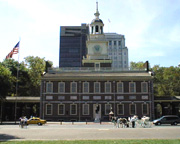|
  
- UID
- 12794
- 帖子
- 8758
- 积分
- 11225
- 学分
- 55327 个
- 金币
- 800 个
- 在线时间
- 799 小时

|
|
Philadelphia (U.S.) |  Although it's dear to the hearts of America's flag-wavers, there's a lot more to Philly(费城)than the Liberty Bell(自由钟)and Independence Hall(独立大厅). Yet, despite the support of patriots and the cappuccino(卡普齐诺咖啡)set, the 'City of Brotherly Love'(博爱之城)has long been the butt of jokes by WC Fields and other laugh-a-minute types. Although it's dear to the hearts of America's flag-wavers, there's a lot more to Philly(费城)than the Liberty Bell(自由钟)and Independence Hall(独立大厅). Yet, despite the support of patriots and the cappuccino(卡普齐诺咖啡)set, the 'City of Brotherly Love'(博爱之城)has long been the butt of jokes by WC Fields and other laugh-a-minute types.
When the insults finally soaked in - just in time for America's bicentennial(两百周年纪念)in 1976 - the city began renovating(重修). Philadelphia now enjoys recognition as a major cultural center with world-class museums, performing arts centers and some stunning(极好的)architecture.
In March 1681, England's King Charles II granted William Penn a charter to a parcel of land west of the Delaware River(特拉华河). Charles dubbed the area 'Penn' in honor of William's father, with Penn the Younger adding '-sylvania,' meaning 'woodlands.' Brimming with pacifist Quaker idealism, Penn regarded his colony as a 'holy experiment' and ensured as its governor and proprietor that its laws respected religious freedom and liberal government. Penn chose Philadelphia as the capital of Pennsylvania in 1682, optimistically naming it after the Greek for 'brotherly love.' A survivor of London's Great Fire of 1666, he made sure the city's design included a grid system with wide streets, not the narrow, winding maze that caused so much havoc in England's capital. This format was to become the inspiration for most American cities.
 Philadelphia quickly grew to become the second largest city (after London) in the British empire, before ceding (让于)that title to New York City. Opposition to British policy in the colonies became seated in the city, where colonial leaders would meet to plan their course of action. The result was the Declaration of Independence, and in 1790 Philadelphia became the temporary capital of the new United States before Washington DC got the job in 1800. The US Constitution was drawn up and first read here in 1786. Often led by the multitalented Benjamin Franklin, Philadelphia became a center for developments in the world of arts and science. Philadelphia quickly grew to become the second largest city (after London) in the British empire, before ceding (让于)that title to New York City. Opposition to British policy in the colonies became seated in the city, where colonial leaders would meet to plan their course of action. The result was the Declaration of Independence, and in 1790 Philadelphia became the temporary capital of the new United States before Washington DC got the job in 1800. The US Constitution was drawn up and first read here in 1786. Often led by the multitalented Benjamin Franklin, Philadelphia became a center for developments in the world of arts and science.
Between 1793 and 1820, Philadelphia suffered five yellow-fever epidemics(黄热病), which killed thousands but led to the construction of the US's first city water system. Philadelphia's fortunes declined in the 19th century, as New York took over as the nation's cultural, commercial and industrial center. Philly never regained the stature of its early years, despite continued cultural and educational innovation, commerce and shipbuilding, and a brief boomlet(略微繁荣)following WWII.
During the mid-20th century, like many American cities, Philadelphia watched much of its middle class forsake the city for the suburbs. The 1970s saw Philly grapple with innercity tensions, typified by the firefights between the police and the paramilitary MOVE group. However, by 1976, lavish plans for the nation's bicentennial had inspired a citywide cleanup and renovation campaign - a restoration that continues today - and the city is now consistently rated among the nation's 'best' in national polls of lifestyle and character.
|
|
|